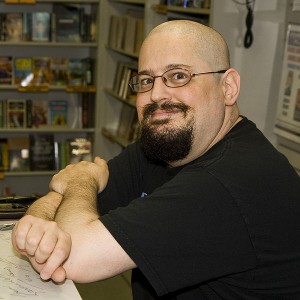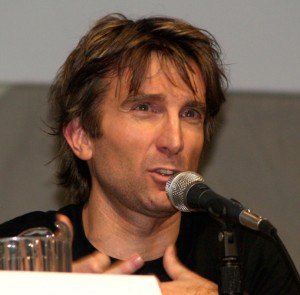Tom Baker interviews sci-fi notables Charles Stross and Sharlto Copley
Tom Baker (Chiba-ken, 1989-91) is a staff writer for The Daily Yomiuri. He usually writes for DYWeekend, the paper’s arts and leisure section. You can follow Tom’s blog at tokyotombaker.wordpress.com.
Recently he interviewed two notable figures from the world of science fiction: novelist Charles Stross, the Hugo Award-winning (and Seiun Award-nominated) author best known for his “Merchant Princes” series, and actor Sharlto Copley, who plays the lead role in the movie “District 9.” Stross in now in Japan to attend the newly launched Hal-Con science fiction convention in Saitama, while Copley was there to promote his film, which just opened in the country. Here are some excerpts:
CHARLES STROSS:
Stross has also written “hard” science fiction, such as his novels Saturn’s Children and Accelerando, which imagine technologically advanced futures in deep detail. Readers of those books may notice a sprinkling of Japanese vocabulary, such as “bishojo,” “chibi” and “kawaii.”
“There were particular reasons for wanting to use it [Japanese vocabulary],” Stross explained. “One issue is globalization of culture. Japan is unusual in that it’s one of the few societies other than North-American-stroke-Anglosphere ones successfully exporting its culture globally. You will find Hello Kitty in shops in the U.K., you will find her in Germany, you will find her all over the world. There’s far less in the way of, for example, German cultural exports. So if you’re going to portray a near future, it is one that is going to be Japanese-influenced to a greater or lesser extent.”
Saturn’s Children is about a robot created to serve humans who must get on with her life in a universe where humans have gone extinct. She’s one of a long line of nearly identical “sibs” who sometimes share their memory chips with each other, blurring distinctions between the individual and the group…
Read the rest of Tom’s interview with Stross here. (And read his review of Saturn’s Children here.)
SHARLTO COPLEY:
As Wikus [Copley’s character] works for a heavily armed private company called MNU, another big issue in District 9 is the movement of military power into the hands of corporations, a phenomenon that has been prominent in recent world news due to the involvement of U.S. contractors such as Blackwater in the war in Iraq. In the movie, MNU is portrayed as a menace, which made Copley’s comment on the topic a bit of a surprise.
“That started with Neill’s fascination with [a South African military contractor called] Executive Outcomes,” Copley said. “That’s actually the start of modern-day privatization, when the South African government changed, and you had incredibly high-level professional soldiers…that had nowhere to go. They weren’t going to work for the new government, and they formed a private military company that went and sorted out various conflicts in Africa–and did amazingly well, actually. It was very controversial, but you couldn’t argue that when 50 guys went in and solved a problem that the United Nations couldn’t with 5,000, that there was definitely something to be said for that.”
Read the rest of Tom’s interview with Copley here.




Comments are closed.